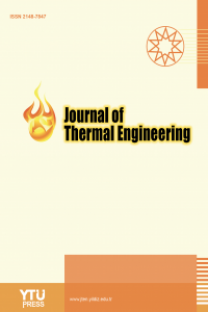PREDICTION SULPHURIC ACID AND WATER VAPOUR DEW POINT TEMPERATURES OF FLUE GASES AND COMBUSTION ANALYSIS FOR SOLID FUELS IN TURKEY
Solid Fuels, Combustion Analysis, Acid Dew Point Temperature, Heat Recovery from Flue Gas Air Preheater,
___
- [1] Wei W, Sun F, Shi Y, Ma L. Theoretical prediction of acid dew point and safe operating temperature of heat exchangers for coal-fired power plants. Applied Thermal Engineering 2017;123:782-790. https://doi.org/10.1016/j.applthermaleng.2017.05.051.
- [2] Xiang B, Tang B, Wu Y, Yang H, Zhang M, Lu J. Prediction acid dew point with a semi-empirical model. Applied Thermal Engineeing 2016;106:992-1001. https://doi.org/10.1016/j.applthermaleng.2016.06.040.
- [3] Blanco JM, Pena F. Increase in the boiler’s performance in terms of the acid dew point temperature:Environmental advantages of replacing fuels. Applied Thermal Engineering 2008;28:777-784. https://doi.org/10.1016/j.applthermaleng.2007.06.024.
- [4] Pena F, Blanco JM. Evaluation of the physical dew point in the economizer of a combined cycle burning natural gas. Applied Thermal Engineering 2007;27:2153-2158. https://doi.org/10.1016/j.applthermaleng.2006.12.021.
- [5] Ding Q, Tang XF, Yang ZG. Failure analysis on abnormal corrosion of economizer tubes in a waste heat boiler. Engineering Failure Analysis 2017;73:129-138. https://doi.org/10.1016/j.engfailanal.2016.12.011.
- [6] Luo Y, Woolley E, Rahimiford S, Simeone A. Improving energy efficiency within manufacturing by recovering waste heat energy. Journal of Thermal Engineering 2015;1:337-344. https://doi.org/10.18186/jte.49943.
- [7] Han H, He YL, Tao WQ. A numerical study of the deposition characteristics of sulfuric acid vapor on heat exchanger surfaces. Chemical Engineering Science 2013;101:620-630. https://doi.org/10.1016/j.ces.2013.07.024.
- [8] Vainio E, Kinnunen H, Lauren T, Brink A, Yrjas P, DeMartini N, Hupa M. Low-temperature corrosion in cocombustion of biomass and solid recovered fuels. Fuel 2016; 184:957-965. https://doi.org/10.1016/j.fuel.2016.03.096.
- [9] ZareNezhad B, Aminian A. Accurate prediction of the dew points of acidic combustion gases by using an artificial neural network model. Energy Conversion and Management 2011;52:911-916. https://doi.org/10.1016/j.enconman.2010.08.018.
- [10] Li X, Wu Z, Zhang L, Liu X, Zhu X, Hu H, Luo G, Hu Z, Liu W, Yao H. An updated acid dew point temperature estimation method for air-firing and oxy-fuel combustion processes. Fuel Processing Technology 2016;154:204-209. https://doi.org/10.1016/j.fuproc.2016.08.033.
- [11] Shi Y, Dai C, Ma Z, Guo Z. Experimental investigation of heat transfer with ash deposition in ultra-low temperature WHRS of coal-fired power plant. Applied Thermal Engineering 2017;123:1181-1189. https://doi.org/10.1016/j.applthermaleng.2017.05.190.
- [12] Cengel YA, Boles MA. Thermodynamics an engineering approach. Guven Scientific Press; 2008.
- [13] Bilgen S. Bazı yakıtların kimyasal ekserji değerlerinin hesaplanması. Yüksek Lisans Tezi 2000. Karadeniz Teknik Üniversitesi, Trabzon, Türkiye.
- Yayın Aralığı: 6
- Başlangıç: 2015
- Yayıncı: YILDIZ TEKNİK ÜNİVERSİTESİ
M. Hatami, Farooq Hassan Ali, Hameed K. Hamzah, Ammar I. Alsabery, Songwei Hu
Lamia Benahmed, Khaled Aliane, Ali J. Chamkha
Muhammet Gul, Melih Yucesan, Ali Fuat Guneri
Hussain Saad Abd, Mohammed Hassan Jabal, Abdulmunem R. Abdulmunem
Ece Ayli, Eyup Kocak, Hasmet Turkoğlu
Afshin Ahmadi Nadooshan, Morteza Bayareh, Narges Jafari Ghahfarokhi, Sara Azadi
Abdelfatah Marni Sandid, Driss Nehari, Abderrahmane Elmeriah, Ahmed Remlaoui
Emad Qasem Hussein, Haider Nadhom Azziz, Farhan Lafta Rashid
